FIC’s Glass Wins Award in Infectious Diseases
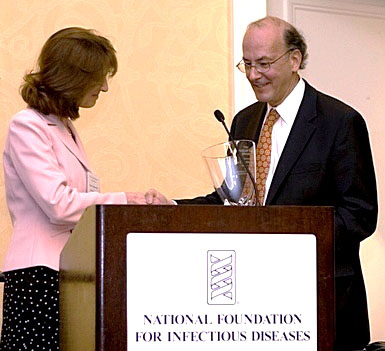 |
| FIC director Dr. Roger Glass accepts the award presented by Dr. Susan J. Rehm, medical director of NFID. |
Fogarty International Center director Dr. Roger Glass was recently honored by the National Foundation for Infectious Diseases
with its Dr. Charles Mérieux Award for his work on rotavirus vaccines in the developing world.
He is the first award winner to have known personally the late Mérieux, a French virologist whose father worked under Louis Pasteur and who built a small lab into one of the world’s leading vaccine manufacturers, Sanofi Pasteur.
The award was presented at the foundation’s annual conference, the world’s largest
scientific meeting on vaccine research and technology for disease prevention and treatment. The prize goes each year to “an individual who demonstrates a commitment to science-based medicine and research in infectious diseases, shows excellence in clinical and research activities and has an unsurpassed dedication to improving public health.”
Glass was cited for his efforts to prevent rotavirus disease among infants and toddlers, more than half a million of whom will die each year in the developing
world from the effects of the diarrhea and dehydration it causes. More than 55,000 American children are hospitalized with it each year.
“To receive an award named for one of the international giants of medicine is humbling, and I accept it on behalf of all those selfless researchers working around the world to put the knowledge they have derived into practice,” said Glass. “As Dr. Mérieux believed, it is not enough to discover treatments—they have to be delivered and administered to the right people in the right place at the right time. It’s what we support at Fogarty, and I hope honors like this inspire a new generation of scientists.”—Ira Allen
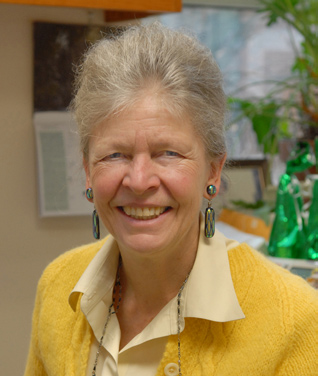 |
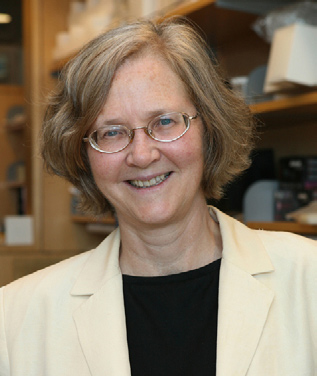 |
| Dr. Joan A. Steitz (l) of Yale University and Dr. Elizabeth H. Blackburn of the University of California, San Francisco |
NIGMS Grantees Are First Women to Win Albany Prize
Dr. Joan A. Steitz of Yale University and Dr. Elizabeth H. Blackburn of the University of California, San Francisco, recently won the 2008 Albany Medical Center Prize in Medicine and Biomedical Research. They are the first women to receive the $500,000 award, which is the largest monetary prize in medicine in America.
Blackburn is renowned for her seminal work on telomeres, the structures that cap the ends of chromosomes and keep them intact, and for her discovery
of telomerase, the enzyme that fortifies telomeres. Her studies have advanced our understanding of the role of telomeres in cellular aging and could lead to treatments for a variety of diseases, including cancer, Alzheimer’s
and Parkinson’s. NIGMS has supported Blackburn’s research since 1978.
Steitz is widely recognized for her pioneering work on RNA. She discovered
small ribonucleoproteins and revealed their role in splicing, a critical
step in the formation of messenger RNAs. Messenger RNAs carry the instructions for making proteins, which play key roles in all of the body’s biological processes. Her findings could lead to breakthroughs in treating a variety of autoimmune diseases, including lupus. Steitz has been supported
by NIGMS since 1979. |
Kotin, First Director of NIEHS, Dies
By Eddy Ball
Dr. Paul Kotin, the first director of NIEHS, died May 12 in Laguna Beach, Calif. He was 91.
A pathologist by training, Kotin was director of the Division of Cancer Etiology
at the National Cancer Institute when he was named head of what was then called the NIH Division of Environmental
Health Sciences, which was officially established in November 1966. With NCI colleague William Payne, Kotin had started planning for the National Environmental Health Sciences Center a year earlier to help address what he argued was an urgent need for toxicity studies “following long-term exposure to low levels of noxious environmental agents…to establish a scientific basis for protection of the public.”
It was under Kotin’s direction that NIEHS achieved institute status in 1969 as the ninth institute at NIH with Kotin as the first director and a budget of $17.8 million. His vision of the new organization was a foundation for the use of innovative, multidisciplinary methodologies and vigorous extramural research programs relying on close relationships with NIH and major universities,
especially those in central North Carolina.
Kotin’s early appointments, such as scientific director Dr. Hans Falk, helped set the tone for scientific excellence that would come to characterize the institute and continued to provide leadership during the 1970s under his successor.
His original vision for the institute was the most comprehensive strategic
plan until then-director Dr. Ken Olden oversaw the Vision for the Future published in 1994. Kotin’s hope that NIEHS could preserve the rural aspect of the area where the new campus would be built proved to be influential in its design and present character.
Kotin considered himself an academic at heart, and in 1971 he accepted an appointment as dean of the School of Medicine, vice president for health sciences
and provost at Temple University. In 1974, he joined the Johns-Manville Corp. in Denver as senior vice president for health, safety and environment.
Kotin was widely regarded as an international expert on environmentally
caused lung diseases, especially those caused by toxic substances such as asbestos and beryllium, and served on many committees and advisory boards as member or chair. He received a number of awards for his contributions to public health including the Department of Health, Education and Welfare Superior Service Award and Distinguished Service Award and the Knudsen Award from the American Occupational Medicine Association.
After his retirement in 1981, Kotin continued to be active in business consulting
and public service capacities. From 1988 to 1990, he served on a National Academy of Sciences committee that provided oversight of the Department of Energy’s management of the U.S. nuclear stockpile.
Kotin is survived by his wife Pauline, two sons, four grandchildren and two great-grandchildren. |
2007 NIBIB Summer Intern Honored by Purdue University
| |
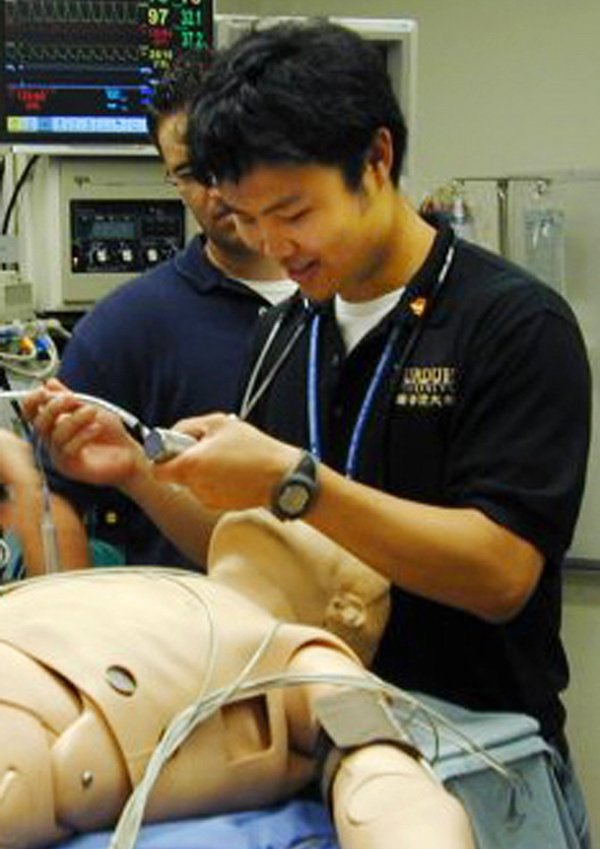 |
Steven Lee learned intubation techniques at the National Naval Medical Center during his 2007 BESIP internship. |
Steven Lee, a 2007 Biomedical Engineering Summer
Internship Program (BESIP) participant, has received the G.A. Ross Award, a top academic
honor from Purdue University. The award is given each year to a graduating senior in recognition
of “an exemplary pattern of student life” as measured by high academic achievement, outstanding
leadership, strength of character and overall contributions to Purdue.
Lee’s confident, yet friendly banter gives the initial impression that he is a typical college student. But further inquiry on academics, his future and his humanist outlook exposes a character that is nothing short of extraordinary.
He is mature beyond his years, with a clear vision for the future. Lee believes his participation in the National Institute of Biomedical
Imaging and Bioengineering’s 10-week BESIP program elevated his academic credentials
and was an important factor in the decision
for the Ross award. It also helped him make important decisions about his academic and professional future.
Lee recalls, “I was introduced to the M.D./Ph.D. program during my sophomore summer internship
at the Indiana University School of Medicine.
I was actually leaning away from doing the program, but it just so happened that the [BESIP] mentor I was working with—Dr. Mark Knepper—was an M.D./Ph.D., and we talked about the program benefits, but also about all the time required to get the degree.”
Lee believes that as knowledge expands, the perceived lines between the disciplines fade, and understanding the dynamics and the interdisciplinary
nature of biomedical science will be critical to solving medical challenges. He explains, “The problem comes when you have so much information that you don’t know how to handle it all. Tackling that kind of problem is going to take people who have the insight to look at the big picture and handle things from a global perspective.”
The compassionate “natural leader” highlighted
in his Ross Award nomination comes to light as he talks of his life goals. “A person hopes to practice medicine for 20 to 30 years, and you want to make a strong impact in the field. It’s possible to improve people’s lives, not just currently, but in the future, and I think the research aspect of the M.D./Ph.D. program will really help me do that,” says Lee.
Already committed to that goal, after spending his spring “break” helping deliver health services
to people in Quito, Ecuador, Lee has a full summer planned. This time it’s a trip to Guatemala,
where he will immerse himself in Spanish
language for 4 hours each day. Outside the classroom, he will help locals through service in a social health care program.
Dr. Robert Lutz, BESIP director, comments, “Steven
was an outstanding BESIP intern. He represents
the quality of all former and future BESIP interns and is a shining example of the wonderful
students that bioengineering programs across the country are producing. It makes me feel confident
and secure that the future of biomedical research is in great hands.”
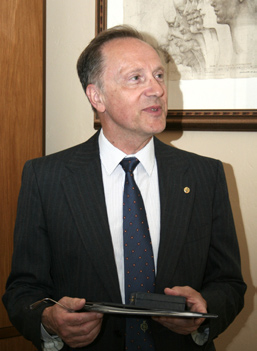 |
Czech Academy Recognizes NCI’s Wlodawer
Dr. Alexander Wlodawer, chief of the Macromolecular Crystallography Laboratory, CCR, NCI, received the Jaroslav Heyrovsky Honorary Medal for Merit in Chemical Sciences, awarded by the Academy of Sciences of the Czech Republic. The ceremony took place in Prague in the presence of the president of the academy, Prof. Václav Paces. The award, first established
in 1965, is given in recognition of outstanding results in the field of chemistry. Wlodawer was recognized for his important contribution to studies of protein structure and for his advisory role in the revitalization of the Institute of Organic Chemistry and Biochemistry in Prague. |